It’s not uncommon for farm equipment dealerships to seek to expand their reach by opening new stores across their region or even throughout the country. However, doing so successfully requires hiring quality employees who can support that growth — and that’s not always easy, according to Jim Lancaster of H&R Agri-Power.
“It takes a while to get employees,” says Lancaster, a central regional manager with H&R, a 17-store Case IH dealership based in Hopkinsville, Ky. “There’s an extended learning curve where we’ve got to get folks engaged and give them time to become valuable members.”
Scott Waggoner has observed similar needs with his company, Van Wall Equipment, a 29-store John Deere dealership, based out of Perry, Iowa.
“You need to make sure your workforce is in a good spot so you can continue to grow your business,” says Waggoner, Van Wall’s lead recruiting specialist.
To simplify the hiring process and reduce the learning curve for new employees, both Lancaster and Waggoner have implemented recruitment programs in which their companies partner with area high schools, community colleges and universities.
“We’ve built great relationships with community colleges in our area of responsibility,” says Waggoner. Van Wall works with Northeast Iowa Community College (NICC) in Calmar, Iowa, and Southeast Community College (SCC) in Milford, Neb., to sponsor students enrolled in each school’s John Deere Tech program.
Dealer Takeaways
- If your dealership has multiple locations across a wide geography, make sure to recruit from colleges, tech schools and high schools that are local to the store to help attract candidates who may not want to move far from home.
- Building relationships with local colleges and high schools is important, but it takes time and dedication. You need to have someone dedicated to the relationship who is talking and meeting with the schools every semester.
- It’s not enough to partner with community colleges and universities. It’s important to develop a visible presence in area high schools as well.
Students following this learning path divide their time between listening to instructor presentations and applying their learning in person, Waggoner says. They also participate in rotations between the school and the sponsoring dealership locations.
“They’ll go to school for 3-4 months, then rotate back to the dealership, then go back to school,” Waggoner says. “They do that 3 or 4 times, then they graduate with their associate degree.”
Waggoner is pleased with the results of this partnership.
“Graduates of these programs have been able to transition to full-time employment significantly easier than if we did other recruiting efforts — using LinkedIn or Indeed, and hiring people outside the company,” he says. “It’s a built-in pipeline for our 29 ag stores.”
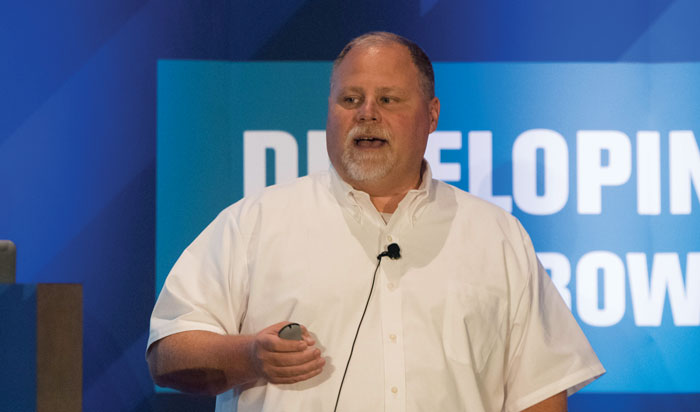
Jim Lancaster, regional manager, H&R Agri-Power, says they have found success in recruiting students from colleges and universities surrounding all of their locations, not just the headquarters in Hopkinsville, Ky.
Because Van Wall’s collaboration with NICC and SCC has been so successful, Waggoner was inspired to seek out additional partnership opportunities. That eventually led him to partner with Des Moines Area Community College (DMACC), which has multiple campuses throughout Central Iowa.
“We wanted to model a program after the ones we had with [NICC and SCC],” Waggoner says. “That’s how we started the conversation. We ended up building our own curriculum out, hiring an instructor and partnering with DMACC on this adventure.”
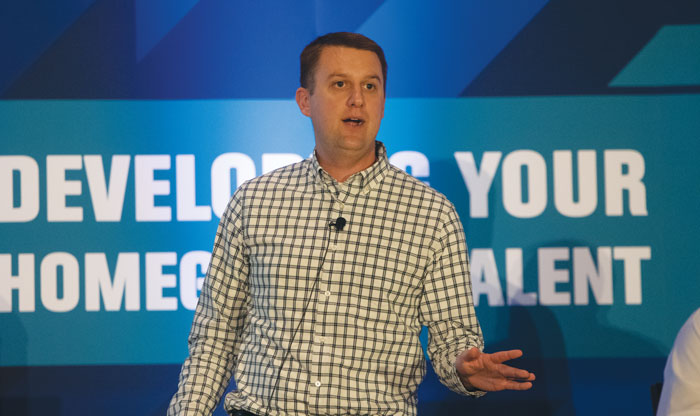
Scott Waggoner, lead recruiting specialist, Van Wall Equipment, says the dealership celebrates those who enroll in their tech program, holding a signing day similar to Division I athletes.
Students who enroll in DMACC’s Power Equipment Tech program — which launched this fall — will graduate in 21 months with an associate degree in power equipment, Waggoner says. Core classes will be taught in one of Van Wall’s facilities in Boone, Iowa, which has been partially converted into a classroom and shop for student use.
“Getting back to the core DMACC campus for gen ed [classes] is only a 2- or 3-minute drive,” Waggoner says. “The logistical aspects really came together nicely.”
Recruit Locally to Increase Retention
H&R Agri-Power has spent 7 years fine-tuning its recruitment program, which targets students at colleges and universities farther afield from the company’s headquarters in Hopkinsville, Ky., Lancaster says.
“When we first [started the program], we wanted people who would relocate to any location,” he says. “At that time, we were in Kentucky, Indiana, Illinois, all the way down to Mississippi. That’s a pretty wide gap.”
Lancaster says the company struggled with getting program participants to follow through on their promise to move wherever the company sent them if it meant they’d be relocating to a state far from home.
“We used to get them to go to those locations temporarily, but we haven’t had a lot of success getting them to stay long-term,” he says. “Now we’re actually going to those places and trying to find people from those locations. We have to go down to those schools, gather those folks, bring them in, train them, then send them back closer to home. Recruit from the location.”
A big incentive for participation in H&R’s recruitment program is the compensation package, Lancaster says. In addition to a competitive salary, trainees are eligible to enroll in the company’s full benefit package after 60 days, and recruits who have relocated to participate in the program are provided with housing. Additionally, he says there’s a guaranteed salary increase once the housing stipend is no longer available.
Waggoner says the benefits are similarly enticing for participants in Van Wall’s training program.
“The biggest selling point for us is 100% of the student’s tuition is covered by Van Wall upfront,” he says. “[Students] do not get any bills — they do not have to take out any loans. That is a huge stress reliever for any student going to school, as well as the parents. We take that off their plate.”
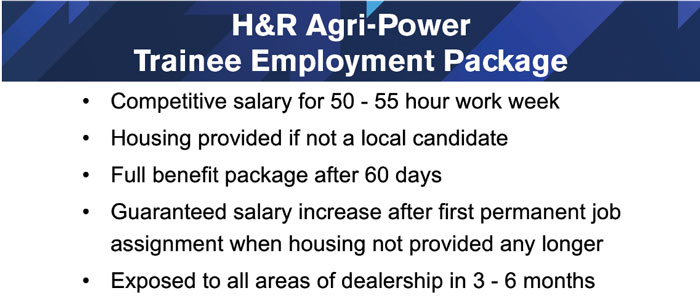
H&R Agri-Power’s program prepares individuals to work in any area of the business, and provides housing and a competitive salary. Trainees receive full benefits after 2 months.
Additionally, students are compensated for the time they spend in their on-the-job rotations, and Waggoner says compensation increases for those who maintain a GPA higher than 3.0 for the semester. Van Wall requires a minimum 2.5 GPA for program participants.
More than Financial Incentives
Lancaster emphasizes that the benefits of participating in this type of program go beyond financial compensation. It’s also an opportunity for trainees to learn about all facets of the company.
“We expose them to all areas of the dealership,” he says. “[In their] first 3 months, we put them in each department. We’ll put them through the parts, service, wholegoods management. We want them ingrained. We want to put that culture in them from day one.”
Along with that exposure, program participants are closely mentored by Lancaster.
“We start our day together, and we end our day together,” he says. “I always want to debrief at the end of the day. It really works — keeps them engaged.”
Staying in close contact with trainees not only provides necessary support and encouragement, but Lancaster says it’s a key part of determining which area of the company will be the best fit for program graduates.
“As we’re talking through that first 3 months, we know what they like,” he says. “We want these guys to feel comfortable. When they come in, they don’t really know where they’re going to fit. At the end of 3 months, they’ve got a pretty good idea.
“It’s such a wide variety. We’ve got folks working at the parts counter, assistant service managers, warranty administration. We’re trying to put them where they’re most comfortable and where we have a need.”
Waggoner also notes the importance of providing trainees with the opportunity to learn about all areas of the dealership before beginning formal employment with Van Wall Equipment.
“These students are going to know exactly where they’re going to work and what they’re going to be doing [when they complete the program],” he says. “They’ll have established relationships with the store. They’re going to know their service manager, the other technicians, the parts people, the salespeople, members of our leadership team. Some of them will have worked for us for a little over 3 years prior to even starting full-time employment.”
High School Connections are Key
Both Lancaster and Waggoner emphasize that it’s not enough to partner with community colleges and universities. For a program like theirs to be successful, they say it’s important to develop a visible presence in area high schools as well.
“The earlier we can start, the better,” Lancaster says. “We spend time in the high schools — we meet the [Future Farmers of America] and the ag instructor. We meet the guidance counselors. We’re going to the career fairs. It’s really good to go get to know those folks. They’re actually going to match you up with the best candidates. They know this kid right here is perfect H&R material.
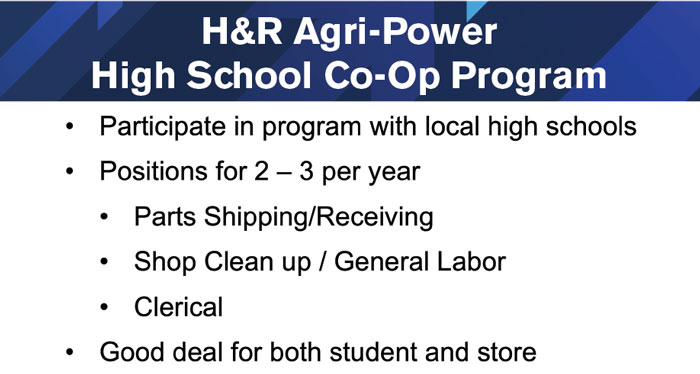
For high school students, H&R Agri-Power offers a co-op program for 2-3 positions each year. The program helps expose high schoolers to the career opportunities available at the dealership.
“But it didn’t happen the first time I met them. I’ve been doing that for the last 7 years. Invest your time, and you’ll be able to find these folks.”
Waggoner agrees.
“Getting out to the high schools [is really important],” he says. “You want to meet with the FFA programs, the counselors, any shop classes, welding, machining, anything that’s hands-on. Make your presence felt on a regular basis. You can’t just go to a school and then not show up for another 18 months or 2 years and expect results.”
According to Lancaster, building connections with high school students doesn’t just help H&R locate the best candidates — it also increases their retention rate once those recruits are working with the company.
“We found the earlier you can start and build that relationship and identify that person, the better your success,” he says. “We’ve had 5 candidates that came from a co-op program where they started with us in high school. We put them in the business and let them start working to get ingrained with us. They get to spend time with us, and we build relationships.”
At Van Wall, a full-time recruiter focuses solely on reaching out to area students and recruiting them for the company’s training program. Waggoner says that individual visits 70-80 high schools each semester, and most of those visits include speaking to classrooms full of students, which opens the door to personal connections. As a result, he says most of the college students sponsored by Van Wall have already spent time working for the company, as a junior or senior in high school.
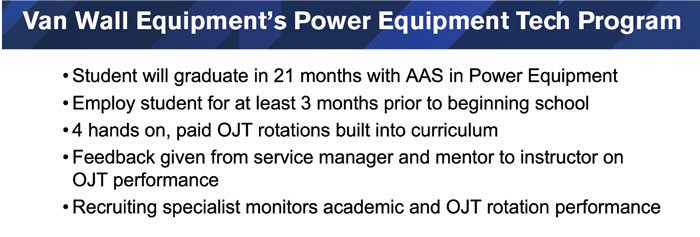
With no formal power equipment technician training program available at local colleges, Van Wall Equipment took the initiative to create their own curriculum and partnered with Des Moines Area Community College to train future employees.
Waggoner says it’s especially important to develop a consistent presence in area high schools because of increased competition from other dealerships.
“There are 2 or 3 different options for a student,” he says. “Which one [will the school] push them to? Probably the person that’s been there every semester for the last few years. The relationship building is important, not only for the students but the personnel molding the students.”
One thing Van Wall does to help its program stand out among the competition is host a signing day for new recruits, Waggoner says.
“It’s just like you would see with a Division I football or basketball player,” he says. “We think this is just as big of an opportunity for them. [When an athlete signs on with a school], you’ll see the high school coach, the college coach, their brothers, their sisters — they’ll all come. They’ll sign the piece of paper and take some pictures. That’s exactly what we do. We’ll sign off on everything and take some pictures and post it on social media. That’s a cool event and one of the parts of the hiring process I enjoy the most.”
Commitment is Key
As excited as he is about H&R’s training program, Lancaster knows not everyone is a good fit for it.
“This business is not for everybody — this is a lifestyle,” he says. “It’s hard when it’s 7 on Saturday evening and something goes down and he’s calling you. It happens once or twice a year, and you’ve got to commit yourself to take care of these customers and build the business. It is a lifestyle change.
“This has to be something you enjoy doing or it’s just going to become torture because it is such a commitment. That’s what we tell [recruits].”
Waggoner is pleased by how much buy-in there has been from store management and company leadership.
“This is built into all company and store meetings — making sure people are aware of what we’re doing and the opportunity that we’re providing for students,” he says. “I would be shocked if you went up to any employee at Van Wall and mentioned the tech program and they don’t know, at a minimum, that we pay for 100% of their tuition. It’s really ingrained within our culture.”
But developing that level of companywide support took time, Waggoner says.
“Be patient as you’re building this up,” he says. “Success will come. This has not been a perfect process. We’ve improved each year. We’re going to continue to improve.”
Facing Reality: Dealers Must Develop Their Own Home-Grown Talent Why Executives Should Train the Next Generation of LeaderDeveloping Leaders Takes Time but Yields Big ResultsHow to Identify, Develop & Retain Your Dealership’s Next Generation of LeadersLeadership Development Must Be ProactiveCollege Recruitment Programs Help Alleviate Hiring Crunch





